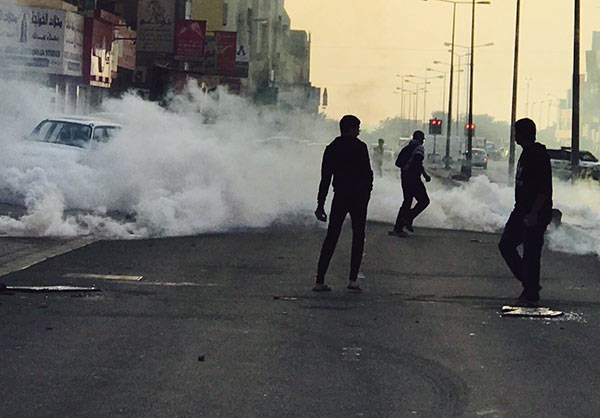
RNA - The rights group gave the warning as nationwide protests are still underway to mark the sixth anniversary of the 2011 popular uprising against the ruling Al Khalifah regime. Hundreds of people have lost their lives and thousands of others sustained injuries. Thousands more have been arrested or gone missing since then. As part of the crackdown on dissent, the regime has also dissolved several opposition groups, including the al-Wefaq National Islamic Society and the Islamic Enlightenment Institution.
As a consequence, and according to Amnesty International, “Bahrain is at a tipping point. If the Al Khalifah regime does not put further control on its security forces, does not respect protesters' rights, and does not halt its executions, it will be dealing with a full blown human rights crisis.”
The long suffering people of Bahrain are used to hearing nice words like this from human rights groups, that "the Bahraini government hasn’t taken meaningful steps towards reform and upholding its human rights obligations.” What they are yet to witness is firm action on the part of the international community to support their legitimate demands for democracy and to stop this full blown human rights crisis.
Nor is that all:
1- The uprising of Bahrain began in a particular period following the critical situations in other Arab countries. The experience of revolutionary developments in these countries had alarmed the rulers of countries in the southern part of the Persian Gulf about any similar developments and the bell had rung for them. Panic created by these events made the rulers of the emirates of the Persian Gulf and their Western allies to adopt a unified policy of oppression. The brutal suppression of the revolutionaries, changing the political protests to critical security issues, and the anti-democracy forces known as the "Island Shield" who crushed and prevented the success of the revolution. Island Shield treaty envisages dispatch of troops and other military aids against a foreign enemy. Are the people of Bahrain foreign enemies of their own country?
2- The geo-political and security environment of Bahrain is fully under the control of regional rulers; besides, governments and trans-regional forces are still involved in the crackdown. They have adopted a unified policy to suppress the revolution. Quite the contrary, the revolutionaries don’t receive any support from the outside world with respect to media coverage or political support (except Iran that just provides political and media support), and that is what has made it easy for the Al Khalifah regime and the House of Saud to implement their policy of oppression.
3- The revolution never receives any serious attention and support from the international community or the world media. The intensity and type of media repression and prevailing security environment prevents the change of the subject into a transnational issue of significant importance. This has allowed the regime to crackdown on the opposition as it sees fit, while the West is part and parcel of the ongoing tyranny, and has contributed to it.
4- The revolution has remained totally unknown to the West. This is by no means accidental; on the contrary, it is deliberately boycotted by the media empires of the West and the Arab world. Even the United Nations and its relevant agencies and human rights groups have not been paying enough attention to the ongoing developments in Bahrain. Part of the issue is rooted in the interests of the US and the UK, and their military collaboration with the Arab states.
5- The continuing climate of impunity amid a very concerning renewed pattern of violations, including arbitrary detention and torture, is due to the fact that the Al Khalifah regime is not alone. It has the full blown support of Saudi Arabia, the United Arab Emirates, the US, and the UK, which happen to have naval bases on there. They go to great lengths to help the unelected regime to silence dissent.
6- Last but not the least, this is not a Sunni-Shiite struggle, as the regime and its patrons suggest. This is a struggle by over 70 percent of the population to find representation in the government and administration of their own country. You may also see a fracture of Bahrain's 30 percent Sunni population standing in alliance with this democracy-seeking movement. Still, that hasn’t stopped Manama and its foreign backers from using such pretext as a temporary distraction to authorize the destruction and raid of Shiite mosques, schools, residences and businesses. They have resorted to dilute the Shiite population by both importing Sunni foreign nationals into the country and stripping Shiite Bahrainis of their nationality.
The point in all this is that Bahrain is the one Arab country whose uprising was definitively put down. One reason is that the US and its regional vassals want it that way. It's the sixth anniversary of the revolution, but they still continue to suppress the uprising in a harsh crackdown. Many people also continue to die while in custody.
Meaning, the uprising is far from over. Nationwide protests continue and human-rights groups like Amnesty International condemn the regime’s actions. Under International Law, therefore, the people of Bahrain have every right to press ahead with their peaceful drive to regain their democratic rights, and to keep on holding demonstrations to realize their demands for an elected parliament and a new constitution.
847/940